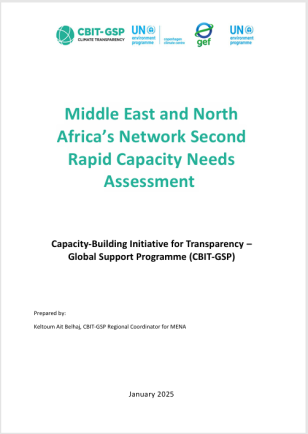Introduction
The Capacity-building Initiative for Transparency - Global Support Programme (CBIT-GSP) is a global support project for capacity-building on transparency, funded by the Global Environment Facility (GEF), implemented by UNEP, and executed by the UNEP Copenhagen Climate Centre (UNEP-CCC). The CBIT-GSP is a five-year project running from 2022 to 2026, offering extensive support to developing countries to comply with the reporting requirements under the UNFCCC and the Paris Agreement.
The project aims to provide streamlined support and capacity building at country, regional, and global levels to help developing countries better respond to reporting requirements under the Paris Agreement. Additionally, it seeks to catalyze increased ambition within country NDCs to contribute to the Paris Agreement's temperature goal of staying well below 1,5°C. As part of the CBIT-GSP project, ten (10) Regional Transparency Networks have been established to support south-south collaboration and knowledge exchange. One such network is the Climate Transparency Network for the Middle East and North Africa (MENA).
The Capacity Needs Assessment Report (CNAR) captures the results of a rapid capacity needs assessment carried out to evaluate the current state of transparency systems and related capacities of MENA Regional Network countries to comply with UNFCCC and Paris Agreement reporting requirements. This assessment was conducted through an online survey between November and December 2024, garnering responses from 13 out of the 17 countries within the MENA regional network. These countries include Algeria, Morocco, Tunisia, Mauritania, and Libya from North Africa, and Iraq, Egypt, Lebanon, Jordan, Somalia, Sudan, Djibouti, and Yemen from the Middle East.
The survey aimed to rapidly assess the status of a country’s transparency system and related capacities to comply with the reporting requirements of the UNFCCC and the Paris Agreement. The first rapid assessment, conducted in January 2024, informed the needs and priorities on climate transparency and helped design concrete supporting activities for the respective regional network under the CBIT-GSP project. This updated version of the survey considered the progress countries have made in preparing their first Biennial Transparency Report (BTR) and recent climate reporting. It aimed to update the status of a country’s transparency system and related capacities, as well as identifying emerging needs to be addressed in the annual work plans of the respective CBIT-GSP regional network for 2025-2026.
This report provides an analysis of the findings from the questionnaire, offering insights into the region's capacity needs and summarizing the key outcomes based on feedback from countries. Respondents primarily represented CBIT-GSP Country Focal Points and thematic experts specializing in GHG Inventory, NDC Tracking, Adaptation, Loss and Damage, and Support Needed and Received. The report identifies three primary priorities for capacity-building needs in these countries, which will serve as critical input for preparing the 2025 Regional Network Work Plan.
Executive Summary
The Capacity Needs Assessment (CNA), conducted between November and December 2024, surveyed 13 out of 17 MENA countries, providing valuable insights into the current state of national transparency systems. The assessment revealed that while some countries have made progress in meeting their transparency obligations, others face significant challenges, particularly in areas such as GHG inventory preparation, NDC tracking, adaptation reporting, and the use of flexibility provisions for BTRs.
Notably, there is wide variation across countries in terms of technical capacity, particularly in sectors like energy and agriculture, where many struggle with data collection and tool utilization.
The assessment also highlighted the varying integration of gender considerations in climate reporting. Some countries require additional support to better mainstream gender issues in their transparency efforts. Additionally, institutional frameworks for transparency reporting are still under development in many countries, and gaps remain in coordination and technical assistance for NDC tracking and loss and damage reporting. The results of the CNA will help shape the 2025 Regional Network Work Plan, ensuring that future efforts are focused on addressing the specific needs identified across the region.
